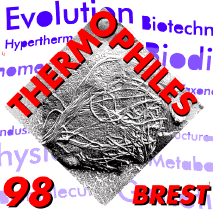Gamma irradiation effect on the
hyperthermophilic archaeon Pyrococcus abyssi.
Emmanuelle Gérard1, Edmond Jolivet2, Daniel
Prieur2 and Patrick Forterre1
1. IGM, Université Paris-Sud, Bât 409, ORSAY
cedex , France, 2 Laboratoire de Biologie marine de Roscoff,
CNRS. 2. Station Biologique, BP 74, 29682 Roscoff Cedex,
France
It have been shown recently that some hyperthermophilic
archaea are highly radioresistant (Kopylov et al., 1993;
DiRuggiero et al., 1997).This radioresistance could be
related to the efficient DNA repair mechanisms which should
correct for DNA damages induced at high temperature in
hyperthermophiles. We have initiated the study of
radioresistance in Pyrococcus abyssi whose genome has been
completely sequenced by the Genoscope and which contains a
small plasmid that could be used to easily probe for DNA
damages. We have tested the effect of gamma irradiation
under different physiological conditions on P. abyssi. Our
data indicate that this archaeon is about 25 times more
radioresistant than E. coli . The radioresistance of
P.abyssi is more important at the beginning of the log phase
than in stationary phase and is higher in anaerobic
condition. We have looked for proteins inducible by gamma
irradiation, using one and two dimensional electrophoresis
on crude extracts of proteins and on extracts of proteins
with affinity for DNA. We found six proteins induced after
gamma irradiation that might be involved in DNA repair.
Finally, we have studied the plasmid pGT5 of P. abyssi after
irradiation and observed that DNA strand breaks appear at
non lethal doses, indicating that DNA repair systems are
indeed necessary for the radioresistance and that pGT5 can
be used to detect intracellular DNA damages.
This work has been supported by a grant from EDF (contrat
RB97-24)
DiRuggiero, J., Santangelo, N., Nackerdien, Z., Ravel, J.
& Robb, F. T. (1997). Repair of extensive
ionizing-radiation DNA damage at 95°C in the
hyperthermophilic archaeon Pyrococcus furiosus. Journal of
Bacteriology 179, 4643-4645.
Kopylov, V. M., Bonch-Osmolovskaya, E. A., Svetlichnyi,
V. A., Miroshnichenko, M. L. & Skobkin, V. S. (1993).
g-irradiation resistance and UV-sensitivity of extremely
thermophilic archaebacteria and eubacteria. Mikrobiologiya
62, 90-95.
|
















